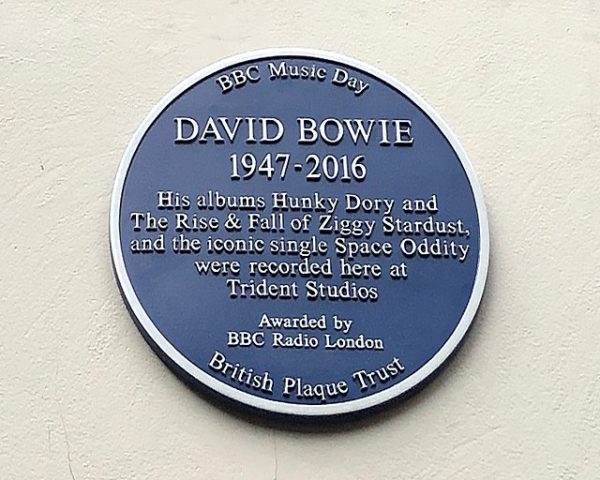“There’s a starman waiting in the sky. He’d like to come and meet us, but he thinks he’d blow our minds.”
With its iconic chorus, accompanied by riveting instrumentals and a strong, liberating voice, ‘Starman‘ is the perfect encapsulation of who David Bowie was as a lyricist, musician, and singer. As if he was from another planet – a persona he took on in many of his performances – David Bowie transcended the norms of music and took creativity to the next level throughout his extraordinary career.
Born on January 8th, 1947 in Brixton, London, David Robert Jones grew up as a prodigy who was singled out for his talent playing the recorder and his tendency to brawl with other children. Bowie excelled at choir and several other instruments including the piano, and his dancing caught the attention of many of his peers and teachers. His obsession with music grew when Bowie’s father introduced him to popular artists like Elvis Presley and Little Richard, who opened his eyes to music. Bowie considered Little Richard a “god” whose influence would later show itself extensively in Bowie’s music.
From that moment on, Bowie dedicated his childhood to familiarizing himself with more musical instruments, like the ukulele and the guitar. He was also set on having as much fun on stage as possible, never without extravagant dancing and theatrics. His father, who encouraged his interests early on, also took him to many concerts that further sparked his passion for music.
Bowie later went on to form his own band at the age of 15, named The Konrads. Together with his bandmates, Bowie played at a variety of venues and weddings. However, he quickly realized that The Konrads’ members were not as enthusiastic about becoming a star as he was, and he eventually withdrew from the band. Bowie would join many different bands after that, acquainting himself with several other prominent figures in the musical industry and gradually creating a name for himself.
His solo debut album in 1967, David Bowie, was a combination of baroque pop, a fusion of classical and rock music, and music hall sounds inspired by many contemporary British rock bands. Though many musical journalists were impressed by his messages of childhood innocence in the album, it did not resonate heavily with the public. Nevertheless, it would set the foundation for Bowie’s evolution as a singer; all of Bowie’s albums were like experiments that he tested again and again until he eventually created his own perfect mixture.
In 1969, Bowie’s musical career really lifted off, humorously, with the release of his album, The Rise and Fall of Ziggy Stardust and the Spiders from Mars. This eccentric album set Bowie’s music apart from other artists at the time. The music was not only unique in its gloomy melody and storytelling lyrics, but was also partnered with Bowie’s flamboyant costumes, extravagant makeup, and dramatic theatrics during his concert performances. Bowie took on the persona of an androgynous alien called Ziggy Stardust, effectively blurring the lines between reality and the extraterrestrial. His audience loved this concept, and Bowie was officially dubbed a rockstar of his time.

Using this momentum , Bowie continued to push musical boundaries and showcase his exceptional talent as an evolving artist with his albums, Hunky Dory and The Man Who Sold the World. With each album, he experimented with different genres and combined new instrumental techniques into his music, never staying still as an artist and continuously shocking his fans.
The 1970s was an especially successful decade for David Bowie; he released several albums and worked with other stars at the time, performing a duet with Queen in their hit single ‘Under Pressure‘ and collaborating with Mick Jagger on ‘Dancing in the Street.’
In the 1980s, Bowie struck the musical scene with yet another genre. He mixed danceable rhythms with pop and created albums like Just Dance that became mainstream. While this afflicted many musical critics with skepticism, Bowie’s reputation as a versatile artist was cemented once again.
Then, Bowie temporarily ceased his brief career as a solo artist and founded a new band, Tin Machine, and took the chance to experiment with more raw sounds that were purely guitar-driven. In the 1990s, he continued to play with more sounds and genres while participating in more musical collaborations and building up his artistic career. He even took on acting in T.V. shows, with roles that ranged from FBI agents to Renaissance painters. The entertainment industry and everything in between was like a playground for David Bowie; the whole world was his stage.
However, beneath all his fame and freedom as a rockstar, Bowie struggled with substance abuse and constant insecurities. He constantly took arbitrary breaks in his career, only to come back with new albums in a spontaneous, erratic pattern that confused many of his fans. Bowie expressed that his personas on stage were a way of hiding who he really was; being able to freely express himself was only possible when he hid behind camouflaging makeup and eccentric costumes. The inconsistencies in his career and his own doubt in his music were also the reasons for the many genre shifts in his music. In a way, Bowie’s music was a defense mechanism that allowed him to vent his miseries in a universal language that everybody could understand.

On June 8th, 2016, Bowie’s 69th birthday and two days before his shocking death from liver cancer, David Bowie released his last album, Blackstar, as a parting gift to his fans. He had kept his liver cancer from the public, and knew that his end was near; many of the songs in Blackstar hinted towards his death with lyrics like, “Something happened on the day he died / Spirit rose a meter then stepped aside / Somebody else took his place, and bravely cried / I’m a blackstar, I’m a blackstar.”
The day after his death, Bowie’s fans and music enthusiasts alike collectively raised the online viewings of Blackstar, breaking the existing record for Vevo’s most viewed artist in a single day. The song ‘Blackstar‘ also debuted at the top of several album charts globally, placing on the United Kingdom’s Top 100 and the United States’ Billboard Top 100. Bowie’s gift to his fans was a generous one, and his fans reacted with their own gift of appreciation.
As Tony Victoni, a Belgian Theatre Director and a fan of Bowie remarked, “He always did what he wanted to do. And he wanted to do it his way and he wanted to do it the best way. His death was no different from his life – a work of art. He made Blackstar for us, his parting gift. I knew for a year this was the way it would be. I wasn’t, however, prepared for it. He was an extraordinary man, full of love and life. He will always be with us. For now, it is appropriate to cry.”
As if he was from another planet – a persona he took on in many of his performances – David Bowie transcended the norms of music and took creativity to the next level throughout his extraordinary career.

